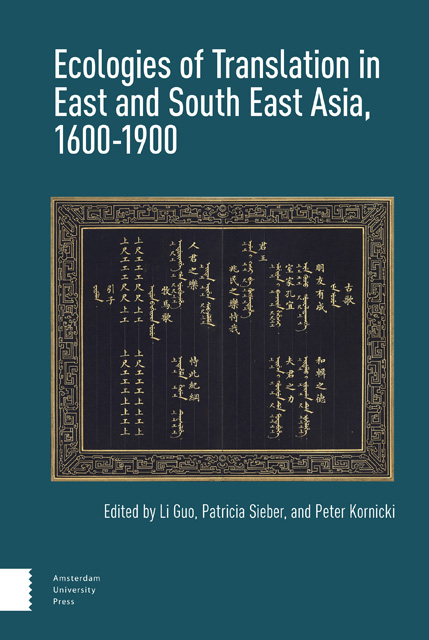Book contents
- Frontmatter
- Table of Contents
- Introduction: Scriptworlds, Vernacularization, and Shifting Translation Norms
- 1 On Not Being Shallow: Examination Essays, Songbooks, and the Translational Nature of Mixed-Register Literature in Early Modern China
- 2 A Faithful Translation: Tsūzoku sangokushi, the First Japanese Translation of Sanguozhi yanyi
- 3 Romance of the Two Kingdoms: Okajima Kanzan’s Chinese Explication of ‘The Annals of Pacification’ (Taiheiki engi)
- 4 Speaking the Sinitic: Translation and ‘Chinese Language’ in Eighteenth-Century Japan
- 5 ‘Body Borrowed, Soul Returned’: An Adaptation of a Chinese Buddhist Miracle Tale into a Vietnamese Traditional Theatrical Script
- 6 ‘Out of the Margins’: The Western Wing Glossarial Complex in Late Chosŏn and the Problem of the Literary Vernacular
- 7 Vernacular Eloquence in Fiction Glossaries of Late Chosŏn Korea
- 8 Imagined Orality: Mun Hanmyŏng’s Late Nineteenth-Century Approach to Sinitic Literacy
- 9 Linguistic Transformation and Cultural Reconstruction : Translations of Gorky’s ‘Kain and Artem’ in Japan and China
- Index
8 - Imagined Orality: Mun Hanmyŏng’s LateNineteenth-Century Approach to SiniticLiteracy
Published online by Cambridge University Press: 16 November 2022
- Frontmatter
- Table of Contents
- Introduction: Scriptworlds, Vernacularization, and Shifting Translation Norms
- 1 On Not Being Shallow: Examination Essays, Songbooks, and the Translational Nature of Mixed-Register Literature in Early Modern China
- 2 A Faithful Translation: Tsūzoku sangokushi, the First Japanese Translation of Sanguozhi yanyi
- 3 Romance of the Two Kingdoms: Okajima Kanzan’s Chinese Explication of ‘The Annals of Pacification’ (Taiheiki engi)
- 4 Speaking the Sinitic: Translation and ‘Chinese Language’ in Eighteenth-Century Japan
- 5 ‘Body Borrowed, Soul Returned’: An Adaptation of a Chinese Buddhist Miracle Tale into a Vietnamese Traditional Theatrical Script
- 6 ‘Out of the Margins’: The Western Wing Glossarial Complex in Late Chosŏn and the Problem of the Literary Vernacular
- 7 Vernacular Eloquence in Fiction Glossaries of Late Chosŏn Korea
- 8 Imagined Orality: Mun Hanmyŏng’s Late Nineteenth-Century Approach to Sinitic Literacy
- 9 Linguistic Transformation and Cultural Reconstruction : Translations of Gorky’s ‘Kain and Artem’ in Japan and China
- Index
Summary
Abstract
This chapter studies Mun Hanmyŏng's 1885manuscript edition of a thirteenth-century Chineseplay The WesternWing. In his effort to make sense of theplay (in classical Chinese with patternedcolloquial elements and steeped in a performancetradition foreign to late nineteenthcentury Koreanreaders), Mun sought commonalities between theplay and the literary Sinitic tradition in Koreaby invoking orality as a hermeneutic device.Drawing upon words from Confucian teachers, thepoetic canon, and spoken Korean expressions, Munwas able to ‘translate’ the play not by crossinglinguistic and cultural barriers but by aligningan unfamiliar linguistic experience withinChosŏn's existing Sinitic tradition in an imaginedtextual continuum, thus reinforcing the act ofreading as an emotionally charged, communalexperience for moral cultivation.
Keywords: orality, reading, Siniticliteracy, hanmun,Mun Hanmyŏng, The WesternWing
Introduction: Sinitic literacy, translation,and Mun Hanmyŏng
The Story of the WesternWing 西廂記 is a thirteenth-century northernplay attributed to Wang Shifu 王實甫. Reprintedrepeatedly in a rich assortment of criticaleditions, the play remained the most popular readingmatter throughout late imperial China. ReachingChosŏn Korea as early as 1504, the play seemed tohave drawn Korean scholar-officials’ attentionmostly in a seventeenth-century edition bearing JinShengtan's 金聖歎 (1608-1661) ‘Sixth Genius Book’commentary, according to records that mentionedelite Chosŏn men of letters such as Yi Sanghwang 李相璜(1763-1849), Yi Mansu 李晚秀 (1752-1820), and Pak Chega朴齊家 (1750-1805). But these records are typicallycouched in critical terms in tune with the politicalenvironment under the rule of King Chŏngjo 正祖 (r.1776-1800), whose stern stance on reinvigoratingConfucian classical learning and resisting what wasconsidered frivolous styles in casual prose andfiction from China was exemplified by what modernliterary historians have often called aRectification Campaign 文體反正 following the termcoined by Takahashi Tōru 高橋亨 (1878-1967).
For example, the Northern Learning scholar Yi Tŏngmu李德懋 (1741?-1793), in his letter to Pak Chega,dismisses Pak's obsession with The Western Wing as mere folly – yetthis critique is somewhat mitigated by the fact thatYi Tŏngmu had also been reprimanded by Chŏngjo forhaving imitated the casual prose style in his ownwritings.
- Type
- Chapter
- Information
- Ecologies of Translation in East and South East Asia, 1600-1900 , pp. 257 - 292Publisher: Amsterdam University PressPrint publication year: 2022



